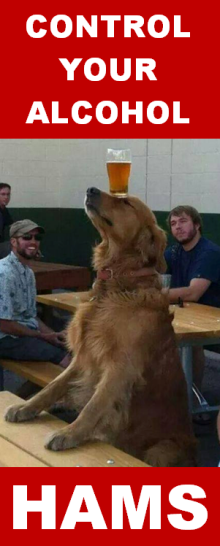Some people in HAMS can make a drinking plan for their ultimate drinking goal and immediately start sticking to that plan and change all in one step. However, for most Hamsters change is a slower process. If you make your ideal drinking plan and find that it is impossible to stick to--don't give up--you will get there eventually. You may be trying to make to big of a transition all at once--if you find this happening you can try doing the following things instead:
- Chart your drinks and keep trying to keep the numbers down without having any specific numerical goal for the present--wait till later when you are more comfortable to make a specific plan
- Make a plan that is less strict than your ideal plan and stick to that for a month or so first--then revise to stricter plan as you get more confidence
- Do an abstinence period to reset your tolerance and your thinking about alcohol
- Add one abstinence day the first month, two the second, and so on
- Try reducing by one drink per day--or try starting later or stopping sooner
As you can see all of the above are examples of moving forward by using a plan or a method that is less drastic than your final ideal plan. How long will it take to move from a transitional strategy like this to the final plan? That depends on the individual--it could be a month or six months or more.
Since this is HAMS people are also allowed to change their plans. Maybe next year you will decide to move from harm reduction to alcohol abstinence. Or maybe in two years you will decide to move from alcohol abstinence to moderate drinking. All these things are all right and you are welcome to take your time in accomplishing them.
However, we would like to remind you that harm is hierarchical and that we encourage you to eliminate the most harmful aspects of your drinking first. These include things like drinking and driving, getting fired from your job for drinking, or drinking until you have life-threatening withdrawals. If you can avoid these major harms then you should not beat yourself up if you fail to become a perfectly moderate drinker or an abstainer over night. And if you are happy engaging in recreational intoxication on occasion when it does not interfere with other things in your life then that is a fine harm reduction goal, too.
It can take six months to a year after you successfully change a habit to get to the point where cravings fade and where the new habit becomes second nature. This is true whether your new habit is one of Harm Reduction, Moderate Drinking, or Abstinence from Alcohol. The one exception to this is if you decide to attend a program like AA. AA constantly dwells on the power of alcohol and the fact that you only have a daily reprieve "due to the grace of God" and therefore you may never feel your cravings for alcohol fade if you keep fanning their flames by attending AA meetings. It is good for AA membership to keep you teetering on the edge of relapse like this--but it is not good for you as a person.
Prochaska et al studied a large pool of smokers who were attempting to quit smoking and came up with the following timeline to describe the AVERAGE amount of time that people spent in various stages (quoted from wikipedia):
- Precontemplation - "people are not intending to take action in the foreseeable future, usually measured as the next 6 months"
- Contemplation - "people are intending to change in the next 6 months"
- Preparation - "people are intending to take action in the immediate future, usually measured as the next month"
- Action - "people have made specific overt modifications in their life styles within the past 6 months"
- Maintenance - "people are working to prevent relapse," a stage which is estimated to last "from 6 months to about 5 years"
- Termination - "individuals have zero temptation and 100% self-efficacy... they are sure they will not return to their old unhealthy habit as a way of coping"
- In addition, the researchers conceptualized "relapse" which is not a stage in itself but rather the "return from action or maintenance to an earlier stage"
Of course these numbers are just averages and everyone is different. Moreover, these numbers are about smoking cessation and may differ considerably from people working on alcohol harm reduction or moderation. The main reason that we quote them is to let you know that it is all right if it takes you some time to reach your ideal goal with drinking alcohol--don't beat yourself up if you do not achieve perfection immediately!
Remember that things like CBAs and charting and goals and plans are tools to help you get from contemplation stage to maintenance or termination stage. Going from thinking that making a change in your drinking (contemplation) to achieving the final goal where you are completely happy with your drinking can take anywhere from a few weeks to a few years. So take your time. Rome was not built in a day.
We spent a lot of years developing our drinking habits--it may also take more than a day to change them. Don't be afraid to pace yourself-- moving too fast can backfire and leave you worse off than before.
Whatever you do don't beat yourself up for not being perfect.
REFERENCES:
Miller WR, Heather N, editors. (1998). Treating addictive behaviors. 2nd ed. New York: Plenum Press. ISBN 0306458527.
Prochaska JO, Norcross JC, DiClemente CC. (1994). Changing for good: the revolutionary program that explains the six stages of change and teaches you how to free yourself from bad habits. New York: W. Morrow. ISBN 0688112633.
Wikipedia - Transtheoretical Model



